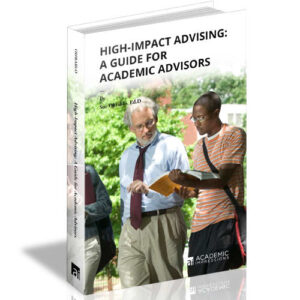
This article is an excerpt from Sue Ohrablo’s acclaimed book High-Impact Advising: A Guide for Academic Advisors, which you can find here.
When working with students, advisors are likely to encounter students who blame others for the academic challenges they experience. It is the responsibility of the advisor to provide a sympathetic ear and refrain from judgment while creating a non-threatening environment. The advising session should be a safe place for students to express their concerns without fear of retribution or rejection. In such an environment, students are apt to be more candid in their assessments about faculty and peers.
Scenario: The Hard Professor
Advisors know the reputations of many faculty members, especially those who are considered “hard” or “demanding” by students. Although, in the back of our minds, it might be tempting to think, “Yeah, he’s a real hard-nose,” buying into that characterization of the faculty member does not provide the student any assistance. Instead, the advisor can add value by providing strategies to the student.
For instance, a faculty member may be known to criticize students’ academic abilities by using what is interpreted to be a condescending tone when communicating with students. The faculty member may point out deficiencies in a student’s work, often leaving a trail of red throughout the assignment.
In a situation like this, an advisor can provide assistance by having an honest discussion with the student. Sometimes, just by reading the comments, the advisor can determine what feedback and direction to give the student. An objective interpretation of the statements made by the faculty member may take some of the emotional charge out of the situation.
Another strategy is to help students to distance themselves from the emotional impact of student-faculty communication.
Let’s examine a real example of an emotionally charged interaction between a student and faculty member. A student informed a professor that he needed to miss a class session, but that he felt capable of keeping up, as his classmates told him that it shouldn’t be a problem and agreed to share their notes with him. He also informed the professor that he had successfully made up missed class sessions in other courses. This is the reply he received:
“I have taught this class for [many] years and if you choose to accept the recommendation from students who have participated once, that is your choice. To your point of what other professors have done is of no consequence to me nor is your opinion of what is and isn’t detrimental in my class. You can do as you choose, but understand full well, you do so at your own peril, sir.”
One can imagine the emotional impact this reply had on the student. The professor’s response can be interpreted to be dismissive, arrogant, and antagonistic. The student may respond with fear and/or anger, and is at risk for shutting down, dismissing any further input from the professor, and possibly withdrawing.
This is an opportunity to help the student understand the possible reasons for the professor’s reply, as well as discern the information that the professor is providing.
For example, the professor has likely interpreted the student’s request to miss a class session as devaluing and deprioritizing the course. Help the student see the situation from the professor’s view, and brainstorm ways to avoid this perception in the future.
Second, the professor’s use of the word “peril” clearly communicates that there will be negative consequences if the student misses the class session. The advisor can help the student weigh his options and understand the outcomes of any particular decision. Perhaps the student needs to know the exact consequence of missing a class session. Will he fail the course? Will he lose points? Will he fall behind? Point him to the syllabus and, if necessary, help him engage in further communication with the professor to seek this information.
By helping students navigate conflict with faculty, you can help students build resiliency and affect positive change.
Tips for Addressing Common Student Concerns Regarding Faculty
- “I am afraid to bother my professor,” or “I don’t know how to contact my professor.”
- Help the student use the syllabus to identify faculty expectations regarding communication: contact information, office hours, and preferred methods of communication.
- “I don’t know if I can meet the deadlines because of the problems I’ve been experiencing,” or “My professor is unfair and won’t take any late work.”
- Help the student use the syllabus to identify faculty expectations regarding deadlines: are there firm deadlines in place? What are the implications of late work?
- Assist student in setting goals to complete work prior to deadline to allow for unanticipated delays.
- “I think I am going to fail this class,” or “I don’t know if I can pass at this point.”
- Help the student use the syllabus to identify grading scale, assignment weights, etc.
- Identify options such as rewrites and dropped grades.
- Help to reduce the fear of the unknown
- “The professor is being unreasonable in his criticism of my work,” or “She has it out for me.”
- Ask the student to provide you examples of feedback that the faculty member has given. Review the feedback from an objective perspective.
- Help student develop a plan to address one issue at a time.
- Identify any emotional response of student which may act as a barrier to academic success.
RECORDED TRAININGS FOR ACADEMIC ADVISORS
Academic Advising Records: Implications for Electronic Documentation
New Advisor Training: Developmental Advising via Email
_______________________________________________________________________________
Get Sue Ohrablo’s Book High-Impact Advising
 How can academic advisors provide high-quality developmental advising in the face of diminishing resources and increased commitments? We brought this question to Sue Ohrablo, a nationally recognized speaker with 25+ years of experience working with diverse institutions and student populations. In this 300-page, comprehensive training guide, Sue offers practical guidelines for academic advisors.
How can academic advisors provide high-quality developmental advising in the face of diminishing resources and increased commitments? We brought this question to Sue Ohrablo, a nationally recognized speaker with 25+ years of experience working with diverse institutions and student populations. In this 300-page, comprehensive training guide, Sue offers practical guidelines for academic advisors.
“I highly recommend that all academic advising professionals read High-Impact Advising: A Guide for Academic Advisors, as it will help them to enhance key skills needed to establish positive relationships with students, appropriately assess students’ needs, effectively teach students, and efficiently provide high quality service.”
Jacqueline T. Hollins, Assistant Vice Provost/Director of Academic Advisement, SUNY at Buffalo (UB)
“As a department leader in academic advisement, I would use Sue’s book as a training resource and teaching mechanism for advisors. It allows advising professionals to understand today’s complex environment of advising students, beyond just selecting courses.”
Jake Shilts, Director, Advisement & Career Services, Miami Dade College
“Advisors will reap the benefits of this well-balanced, informative guide.”
Shari Saperstein, Associate Dean, College of Undergraduate Studies, Nova Southeastern University
“A student-centered, informative, and practical approach. Dr. Ohrablo presents powerful guidelines geared towards student success for 21st century academic advisors. The handbook offers indispensable information and engaging scenarios that mirror real life college instances that students experience. A key resource tool for academic advisors and higher education professionals.”
Dr. DeLaine Priest, Associate Vice President of Student Development and Enrollment Services, University of Central Florida

